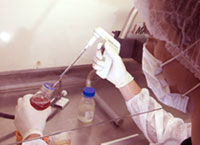News
FAPESP signs groundbreaking MoU with RCUK
 A pioneering MoU was signed with Research Councils UK, strengthening existing valuable research links between the UK and Brazil
A pioneering MoU was signed with Research Councils UK, strengthening existing valuable research links between the UK and Brazil
A pioneering MoU was signed today between Research Councils UK (RCUK) and FAPESP, the Research Council for the State of São Paulo, strengthening existing valuable research links between the UK and Brazil. The MoU will enable Brazilian and UK researchers to apply for funding through a single application and peer review process, removing some of the barriers facing international research collaboration. Researchers joined ministers and officials from both countries in celebrating this significant achievement.
Professor Ian Diamond, Chair of RCUK, welcomed the agreement: "This is a fantastic indication of the direction international collaboration is taking within the Research Councils. RCUK is dedicated to promoting the collaboration of best with best, and this agreement demonstrates our commitment to widening opportunities for researchers, so that world-class researchers can work together on excellent research."
Science Minister Lord Drayson, who also attended the signing, said: "I am delighted that such an important agreement is now in place. Researchers in the UK and Brazil can reap the benefits from collaborating without worrying about having to go through separate application processes. I am looking forward to seeing partnerships between the two countries grow stronger as they continue to share expertise and facilities in tackling international challenges such as food security and climate change."
Professor Carlos Henrique de Brito Cruz, Scientific Director of FAPESP, who represented Brazil at the signing, said: "Scientists in the State of São Paulo create 50% of the Brazilian scientific articles. Fostering international collaboration is a relevant portion of our strategy. The cooperation agreement signed with RCUK opens exciting possibilities for researchers in São Paulo and the UK to collaborate in an effective manner. The agreement covers all fields of science and we are looking forward to receive outstanding proposals, dealing with fundamental and applied research."
Professor Yadvinder Malhi, who has carried out extensive research in the Amazon, is part of a community of UK environmental scientists with a long history of working with Brazilian colleagues. He presented some of the community's discoveries and ongoing work to attendees, showing how the Amazon forest is responding to global atmospheric change, and to extreme events such as the drought of 2005. This has led to greater understanding of the critical role than Amazonia plays for both the regional and global climate.
Commenting on the MoU, Professor Malhi said: "Our research in the Amazon is already supported by Research Council funding and it's great that this agreement will make it even easier for me and my co-researchers to access the resources we need."
Professor Carlos A Joly, leader of the most effective biodiversity conservation research program in Brazil, BIOTA/FAPESP: The Virtual Institute of Biodiversity, is particularly interested in promoting joint research projects to understand better the highly destructive relationship between climate change and biodiversity loss. Having done his PhD at St. Andrews University, Prof. Joly is a testament to the long standing cooperation between UK and Brazilian institutions, which will be fostered in the new era of partnerships that is being established by this MoU.
"In the Thematic Project I am developing along an Atlantic Rain Forest altitudinal gradient, we are already working with UK researchers to adapt and develop new equations to estimate forest carbon stocks and changes. But the agreement that is being signed today gives us a fantastic opportunity to broaden the scope of our cooperation and stimulate a more intense exchange of students and research teams", said Prof. Joly.
Secretary of State, Lord Peter Mandelson, commented: "This is further proof that the strong links between the UK and Brazil continue to grow. Cutting-edge research and innovation are very important areas of co-operation in fostering and deepening this vital and mutually beneficial relationship."
- More information about the MoU: www.fapesp.br/english/materia/5339
